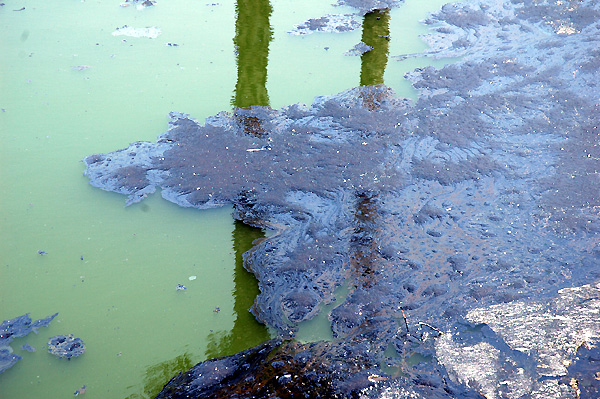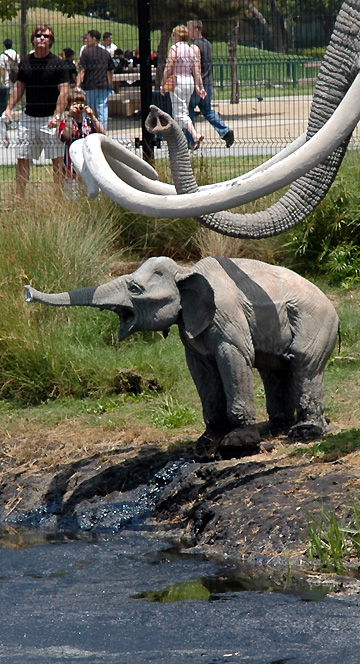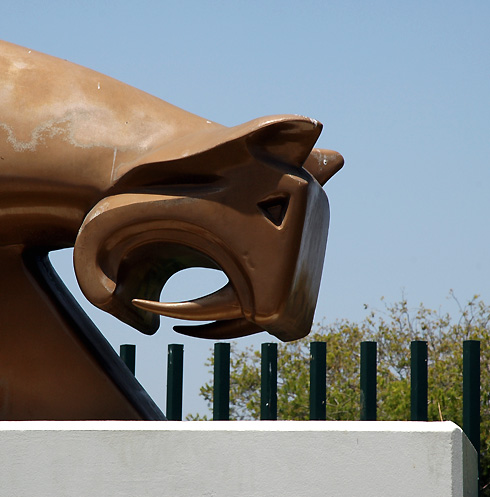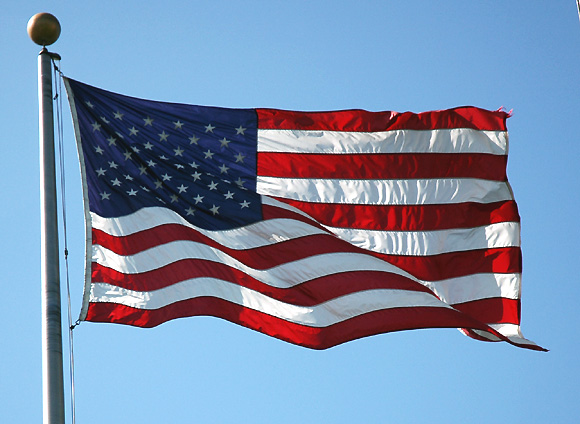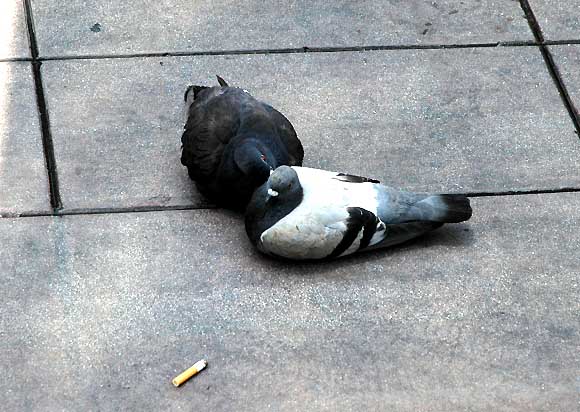Some topics never seem to die. And how strange the French are is one of them.
In a column in late April in the pages you would find an extended discussion of Thomas Friedman's new book The World Is Flat: A Brief History of the Twenty-First Century (Farrar, Straus and Giroux, April 2005, ISBN: 0374292884) and its implications. The world economy is being "flattened" and the nature of who works on what, and for what wages, is radically changing. Any job can be done anywhere. We all have to work vastly harder, and here in the west, for far less, if there are jobs we can do at all, given what cheap high-speed communications has done to the workplace (which seems to be everywhere and nowhere now - even Bangladesh and all that).
The book states the obvious, but Friedman is still flogging his simple thesis - he's become kind of a one-trick pony - and Friday, July 1 in the New York Times he basically railed on the French and said that if they cannot turn themselves into career-driven hard-working Americans doing seventy-hour workweeks and forgoing all vacations, at least the could try to be more like the Irish. That would be in Follow the Leapin' Leprechaun, as he seems fond of cute titles.There is a huge debate roiling in Europe today over which economic model to follow: the Franco-German shorter-workweek-six-weeks'-vacation-never-fire-anyone-but-high-unemployment social model or the less protected but more innovative, high-employment Anglo-Saxon model preferred by Britain, Ireland and Eastern Europe. It is obvious to me that the Irish-British model is the way of the future, and the only question is when Germany and France will face reality: either they become Ireland or they become museums. That is their real choice over the next few years - it's either the leprechaun way or the Louvre.
Say what? His contention is that the German and French political systems will experience massive shocks soon as both these nations are asked to work harder and embrace either more outsourcing, or more young Muslim and Eastern European immigrants, to remain competitive. He says the "French may want to take a few tips from the Celtic Tiger." Ireland, it seems, instituted new laws that make it easier to fire people, and without having to pay any severance. He likes that. Why? Because "the easier it is to fire people, the more willing companies are to hire people."
Is that so? That's what he says explains job growth there. And heck, it is hard to fire anyone in France. And if you do, you pay severance. How... stupid?
He does note Ireland invests a lot in education and such. But he likes the "brutal" offense they have mounted against worker privileges. And he says he'll bet on the offense. That's how France can become rich, like us. And like Ireland.
And France is so damned poor. We all know that. And Freidman is writing from Europe where is now on assignment, looking around. It seems he feels sorry for the unmotivated French folk.
Of course this generated a lot of reaction - which will help Freidman sell his new book no doubt.
Matthew Yglesias here - The key trope of Tom Friedman's columns throughout his European vacation has been that France is poor, and we need to ask why France is so poor, and draw important policy conclusions from this. But is France poor?
In one sense, clearly, yes. If you look at per capita GDP around the world, you'll see that the USA is at $41,557 per person and France is only at $29,203. So something's gone badly wrong in France, right? Well, it's not so clear. Check out table one in "Work and Leisure in the U.S. and Europe" and you'll see that in the US we do 25.13 hours of work per week per working age (i.e. 15-64 year-old) person. The French only do 17.95 hours per working age person. Do a little division, and you'll see that the French are only working 71 percent as long as we are. In return, they're getting a per capita GDP that's 70 percent of ours. In other words, about what you'd expect.
No difference? It would seem for the work done, the results are the same.
But the kicker is in these figures Yglesias trots out - weeks worked per year:
US: 46.16
France: 40.54
And sixty-seven percent of Americans are working age, and only sixty-five percent of French people are.
What does that prove?... France has fewer workers, working shorter weeks, and taking longer vacations - that is why they make less money. Per hour of output, France is generating much more value than America is. If your buddy made 50 percent more than you because he was working 50 percent longer and had four weeks less vacation than you did, it certainly wouldn't be obvious that your buddy had a better job than you do. Similarly, while it's clear that the French have less stuff than we do, they have more leisure time, and it's not obvious that our situation is better. Indeed, it's not clear what "better" would even mean in this context.
... it doesn't seem to be the case that France's preference for leisure over stuff is an unintended consequence of high levels of taxation designed to fund high levels of social services. Instead, it's the result of labor market conditions that were ? designed to have people work less. France could, were it so inclined, instead adopt rules designed to make people work more. Then they would have American-style quantities of stuff, plus French-style levels of public provision, but they would have less time off.
Personally, I have no desire to adopt the French set of social priorities. I like my stuff, and I like working hard. That said, I see no particular reason to condemn France's decision to adopt a different set of priorities. Working less and earning less seems like a perfectly defensible thing to do.
If they choose to do otherwise, great. If they don't, also great. Live and let live.
But whatever you think about this, it's a separate issue from the question of tax-and-spending levels, and it's totally not the case that France is some kind of impoverished basketcase. It's a nation of slackers.
Yep, slackers. (Note that if you go to the Yglesias he links to the source of all his data - so he's not making stuff up.)
Over at Washington Monthly, Kevin Drum chimes in -Matt Yglesias points out today that although French GDP per capita is considerably lower than America's, it's mostly because they have "fewer workers, working shorter weeks, and taking longer vacations." Higher unemployment is also a factor, but basically Matt is right: the French have simply chosen to work less and have more leisure than Americans do.
I wonder how many Americans would make that choice if they could? I used to hang out with a bunch of Swiss guys (who eventually bought the company I worked for), and although the Swiss have a reputation for being pretty industrious, they basically thought we were insane for taking only two weeks of vacation a year.
I pretty much agreed with them - although more in theory than in practice. Like a lot of people, I never even used up my two weeks of vacation a year, and when I left the company I got a big check for unused vacation pay. And I was far from the worst. I had people working for me that I literally had to force out the door because they had accrued 300 hours of unused vacation time and would start losing it unless they took some time off.
Still, I wonder: If you had the option of taking an 8% pay cut in return for getting six weeks of vacation per year instead of two, would you do it? I'll bet a lot of people would.
Maybe so. But it's a question of values.
And the question comes up again and again, as in did in these pages last September in The Work Ethic: Is the route to sanity to do as little as possible in your job while saving yourself for your real life outside the workplace? There we note, or at least imply, that there are people who would go insane - they would lose their grasp of who they are at the core - if they had do define themselves by something other than the work they do and their career. And there are a few Americans who often think their jobs will drive them insane, because that's is not who there are - there's more to life, and to who they are. Yes, these are the cheese-eating surrender-monkeys who walk amongst us, even now.
Digby over at Hullabaloo, amused that Richard Perle, one of the key architects of this Iraq war and late of the Defense Policy Board that advises Rumsfeld, own a home in the south of France and can often be found there, adds Everyone Should Hate France -Tom Friedman is right. France is a real hellhole. Ask anyone who spends any time there. Like Richard Perle, neocon France-hater.
I can't understand those fools who think that France has the best definition of the good life. Who would ever think that great food, great weather, great wine, interesting political conversation, great museums, great writers - long vacations, long meals, light religion, universal health care, laid back sexual attitudes, and beautiful countryside are worth giving up shopping for? They trade money for time to read, think, rest, talk and all those other useless wastes of time.
That's unacceptable. Nobody should go there. Especially workaholic Americans. Not that there's anything wrong with workaholism. I realize it's the highest state of Randian being. Especially if you are working a couple of low-paying, low-satisfaction jobs. God wants you to work hard and buy a lot of shit at Wal-Mart for Jesus. So don't go to France. They don't have anything good to buy.
Digby seems to be one of those cheese-eating surrender-monkeys who walk amongst us.
Ah, France may not have Wal-Mart, but they do have Monoprix - but really not the same thing.
By the way, if you go to Digby or Drum or Yglesias with these links shown you can read many hundreds of comments to each of their posts - as this topic really seems to get to many Americans. There's a whole lot of resentment out there. French dudes are getting long vacations and those who post comments are working seventy hours a week or more with none. Damned French! And for some comments in these pages on Richard Perle, see this, just one of a dozen or more times he has come up.
And on it goes, as in the International Herald Tribune (the Paris-based publication owned by the New York Times) Charles McGrath, the former editor of The New York Times Book Review, on Monday, July 4th gives us Letter from America: Now it's work and work, and grow with the grind, carrying things forward.
His take? The citizens of France are once again taking a pasting on the op-ed pages. Their failing this time is not that they are cheese-eating surrender monkeys, as they were thought to be during the invasion of Iraq, but rather that they voted to reject the new European Union constitution. According to the pundits, this was the timid, shortsighted choice of a backward-looking people afraid to face the globalized future. But another way of looking at it is that the French were simply trying to hold on to their perks - their cradle-to-grave welfare state and, above all, their cherished 35-hour workweek.
What's so bad about that? There was a time when the 35-hour workweek was the envy of the world, and especially of Americans, who used to travel to France just so they could watch the French relax. Some people even moved to France, bought farmhouses, adjusted their own internal clocks and wrote admiring, best-selling books about the leisurely and sensual French lifestyle.
But no more. The future, we are told, belongs to the modern-day Stakhanovites, who, like the famous Stalinist-era coal miner, are eager to exceed their quotas: to the people in India, say, who according to Thomas L. Friedman are eager to work a 35-hour day, not a 35-hour week. Even the Japanese, once thought to be workaholics, are mere sluggards compared with people in Hong Kong, where 70 percent of the work force now puts in more than 50 hours a week. In Japan the percentage is just 63 percent, though the Japanese have started what may become the next big global trend by putting the elderly to work.
Now there's an idea!
Of course McGrath runs the numbers too - 71 percent of Japanese men between the ages of 60 and 64 still work, compared with 57 percent of American men the same age. In France, on the other hand, by the time they reach 60, only 17 percent of Frenchmen, fewer than one in five, are still working.
What's up what that? The rest are presumably sitting in the café, fretting over the Turks, Bulgarians and Romanians, who, if they were admitted to the European Union, would come flooding over the French border and work day and night for next to nothing.
How could the futurologists be so wrong? George Jetson, we should recall - the person many of us cartoon-watchers assumed we would someday become - worked a three-hour day, standard in the interplanetary era. Back in 1970, Alvin Toffler predicted that by 2000 we would have so much free time that we wouldn't know how to spend it.
Well, that didn't work out, and McGrath concedes economic globalization obviously has a great deal to do with the change. Yeah, the world got flat.
But you might want to read his history of work hours down through the ages. As in this -The notion of a regular workweek was a late-18th-century invention, a product of the vastly speeded-up pace of the Industrial Revolution, which instead of liberating workers, virtually enslaved them, dooming entire families to numbing stretches in what Blake called the "dark, Satanic mills." The Mills and Factories Act, passed in England in 1833 to curb the worst labor abuses of the time, limited children 9 and older to 48 hours of work a week and teenagers to 69 hours. Adults worked even longer, and they did so in part simply because they could.
The rat-race is nothing new.
And when we get grumpy about it we can rant about the French, as usual.
__
For the academically minded, Brad DeLong, that economics professor at UC Berkeley finds this in Dissertation Abstracts -Alberto Alesina, Edward Glaeser, and Bruce Sacerdote (2005), "Work and Leisure in the U.S. and Europe: Why So Different?" (Cambridge: Harvard University).
Abstract: Americans average 25.1 working hours per person in working age per week, but the Germans average 18.6 hours. The average American works 46.2 weeks per year, while the French average 40 weeks per year. Why do western Europeans work so much less than Americans? Recent work argues that these differences result from higher European tax rates, but the vast empirical labor supply literature suggests that tax rates can explain only a small amount of the differences in hours between the U.S. and Europe. Another popular view is that these differences are explained by long-standing European "culture," but Europeans worked more than Americans as late as the 1960s.
In this paper, we argue that European labor market regulations, advocated by unions in declining European industries who argued "work less, work all" explain the bulk of the difference between the U.S. and Europe. These policies do not seem to have increased employment, but they may have had a more society-wide influence on leisure patterns because of a social multiplier where the returns to leisure increase as more people are taking longer vacations.
There you go. Someone suggested "work less, work all" and the fools adopted the suggestion, and people got free time and long vacations. We didn't go that way.
__
A number of commentators also point to this post from Germany - The Gloriously Relaxed European Work Ethic - by one Andrew Hammel in a blog called German Joys. Hammel seems to be an expatriate American living there, and it also seems the name of his blog is not ironic.
He responds to Kevin Drum's comment (above) - "If you had the option of taking an eight percent pay cut in return for getting six weeks of vacation per year instead of two, would you do it? I'll bet a lot of people would."
Hammel points out the problem - As I'm sure my dear fellow-countryman Drum realizes, the vast majority of Americans don't have this choice. We educated professionals have a lot of freedom to structure our time how we wish. But how many American Wal-Mart employees could go to their boss and say: "Jeez, I'd like to spend more time with my kids. Can I take all of August off and give up the wage?" The answer is: "Sure, in some other job. I'll give you a friendly incentive to find one in two words: you're fired!"
No, my friend, you'll need to move to another country, one like Germany, to overcome your workaholism.
It seems this guy was never a real workaholic American, though he claims he once worked for four years in American without ever taking a substantial vacation. Well, as most employers here might say, that's a start.
But he moved to Europe, and fell in with habits there. And he has some advice for fellow Americans who consider moving to Europe: Don't brag to other people about how hard you work. If you go up to someone in Europe and say "I work 10 hours a day, six days a week, 51 weeks a year. Look how much I achieve!" you'll get the same reaction you would in America if you said "I wash my hands exactly 169 times a day. Look how clean they are! Look! Look!!!"
Ah yes, there is a gap in what is understood to be of real worth in this world. Obsessive work. Obsessive cleanliness. Whatever.
Back in May of 2003 in the very first post in these pages the discussion was about a friend's concerns just before his first trip to Paris. He is a very conservative fellow, and the founder and CEO of a successful software firm out here. He's more aligned with the "work" obsession. He was afraid no one in Paris would show him what he called "the proper respect" he deserved, as an American (we saved their cowardly asses in two world wars), and as a successful businessman. As I said back then -I've had more than a few years of lectures on how the French know absolutely nothing about business and even less about personal responsibility, on how there are really no successful French businesses except by accident, how the French don't know how to really work, how they don't take work and career and career advancement seriously. Those long lunches, four-week vacations and the thirty-five hour workweek amaze him. And there's usually a bit on how the socialized medical system over there is evil and destroys initiative and so on and so forth.
More than three years later there's an answer to that from this fellow in Germany - about how to get with the sense of what is important over there -... enjoy your free time! Pay attention to the people you are with, and you'll notice that they do things with their free time. They spend lots of time with their friends and family, they pursue hobbies much more complex than catching up on all the episodes of Sex & the City, they visit museums, read complex books, drink a whole lot, go to parties, fairs, and circuses, and take lots of vacations. Imitate them. And then decide whether you'd really give that all up to make $5,000 more a year. If the answer is still "gimme the $5,000," move back to the U.S.
Well, my friend enjoyed himself, but came back. Everyone has his or her priorities.
He still calls the French losers and slackers. And I'm sure they would call him a fool who doesn't know how to live.
One makes one's choices.
___
For the last five years Pascal Riché has been Washington bureau chief of the French daily Libération. He was previously their economic and business editor in Paris and is the author of L'union monétaire de l'Europe, with Pr. Charles Wyplosz, and la Guerre de Sept ans, histoire secrète du franc fort 1989-1996 with Eric Aeschimann - and that earned the IFG Prize of the best economic book of the year.
And he has a web log - A 'heure Américaine - that explains America to the French (and yes, it is in French).
It seems he's about to go on vacation, as he explains here -I'm leaving Washington tomorrow evening, for a five-week vacation across the Atlantic.
Did you just read "five-week vacation"?
Yes, you did.
And I'm talking about 100% real vacation. No middle-of-the-night work from my laptop. Zero contact with my employer.
In the French daily press, every journalist can enjoy at least ten weeks of vacation per year. How is that possible?
And he explains. Click on the link for that.
As for America and its workaholic nature?Do the American people really want this situation? Do they really believe that overworking is a good way to achieve the highest "standard of living" in the world? Do they really think that GDP per capita is the best measure of well-being? I'm not sure. But it would be difficult to even get a debate over the question started in this country. The ethic of work seems too strong, too rooted in American culture to be publicly challenged. And the globalization of economy is not helping: Americans today feel that they have to work "35 hours per day" for remaining the leading country in the world.
Yeah, but what if we suddenly decided we don't want to be the leading country in the world and just want to live better?
No, that'd never happen.
